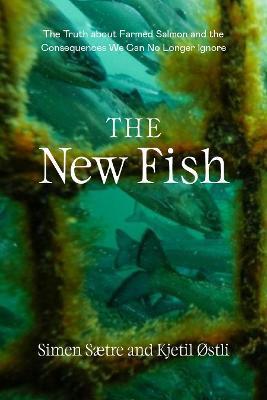The New Fish: The Truth about Farmed Salmon and the Consequences We Can No Longer Ignore

The New Fish: The Truth about Farmed Salmon and the Consequences We Can No Longer Ignore
Eat more fish, the doctors say. But is the salmon you are consuming really healthy? In the early 1970s, a group of scientists researched how to make more food for the growing population of the world. They looked to the sea. They sampled genes from salmon in 41 Norwegian and Swedish rivers and designed a new salmon that was fatter and faster growing. This was considered an amazing innovation and was the beginning of a new industry: salmon farming. The industry spread from coastal Norway to Scotland, Canada, Australia, Ireland, Chile, Iceland, the Faroe Islands, and the United States. Business boomed, jobs were created, and a new type of food, the farmed salmon, spread around the globe. People everywhere bought and enjoyed the abundant fish: grilled, poached, roasted, and as sushi and sashimi. They were grateful for this delicious, affordable protein.
But at what cost?
We now know that there were unintended consequences: some of these new fish escaped, competing for sustenance with other fish in the sea. The new fish spread diseases, salmon louse swarmed, and wild salmon stocks dwindles.
In a prizewinning five-year investigation, authors Simen S tre and Kjetil stli took an in-depth look at Norway's role in the global salmon industry and, for the first time, produced a comprehensive evaluation of the detrimental effects of salmon farming. From lice to escapees, from concentrating the waste of sea pens in the fjords through which wild salmon swim to their natal streams to the fact that salmon farming causes a net reduction of protein reaped from the ocean, the results don't look good. Recent victories, such as the banning of net-pen fish farms in the waters of Washington State, are an indication that we are awakening to the environmental price of engineered fish. It is said that we will continue to make the same mistakes unless we understand them. The New Fish combines nature writing from Norwegian fjords, the coast of Canada, Icelandic landscapes and the far south of Chile with character-driven literary non-fiction and classic muckraking. The authors started with this question: What happens when you create a new animal and place it in the sea? This book will tell you the answer.
PRP: 136.40 Lei
Acesta este Prețul Recomandat de Producător. Prețul de vânzare al produsului este afișat mai jos.
122.76Lei
122.76Lei
136.40 LeiLivrare in 2-4 saptamani
Descrierea produsului
Eat more fish, the doctors say. But is the salmon you are consuming really healthy? In the early 1970s, a group of scientists researched how to make more food for the growing population of the world. They looked to the sea. They sampled genes from salmon in 41 Norwegian and Swedish rivers and designed a new salmon that was fatter and faster growing. This was considered an amazing innovation and was the beginning of a new industry: salmon farming. The industry spread from coastal Norway to Scotland, Canada, Australia, Ireland, Chile, Iceland, the Faroe Islands, and the United States. Business boomed, jobs were created, and a new type of food, the farmed salmon, spread around the globe. People everywhere bought and enjoyed the abundant fish: grilled, poached, roasted, and as sushi and sashimi. They were grateful for this delicious, affordable protein.
But at what cost?
We now know that there were unintended consequences: some of these new fish escaped, competing for sustenance with other fish in the sea. The new fish spread diseases, salmon louse swarmed, and wild salmon stocks dwindles.
In a prizewinning five-year investigation, authors Simen S tre and Kjetil stli took an in-depth look at Norway's role in the global salmon industry and, for the first time, produced a comprehensive evaluation of the detrimental effects of salmon farming. From lice to escapees, from concentrating the waste of sea pens in the fjords through which wild salmon swim to their natal streams to the fact that salmon farming causes a net reduction of protein reaped from the ocean, the results don't look good. Recent victories, such as the banning of net-pen fish farms in the waters of Washington State, are an indication that we are awakening to the environmental price of engineered fish. It is said that we will continue to make the same mistakes unless we understand them. The New Fish combines nature writing from Norwegian fjords, the coast of Canada, Icelandic landscapes and the far south of Chile with character-driven literary non-fiction and classic muckraking. The authors started with this question: What happens when you create a new animal and place it in the sea? This book will tell you the answer.
Detaliile produsului










